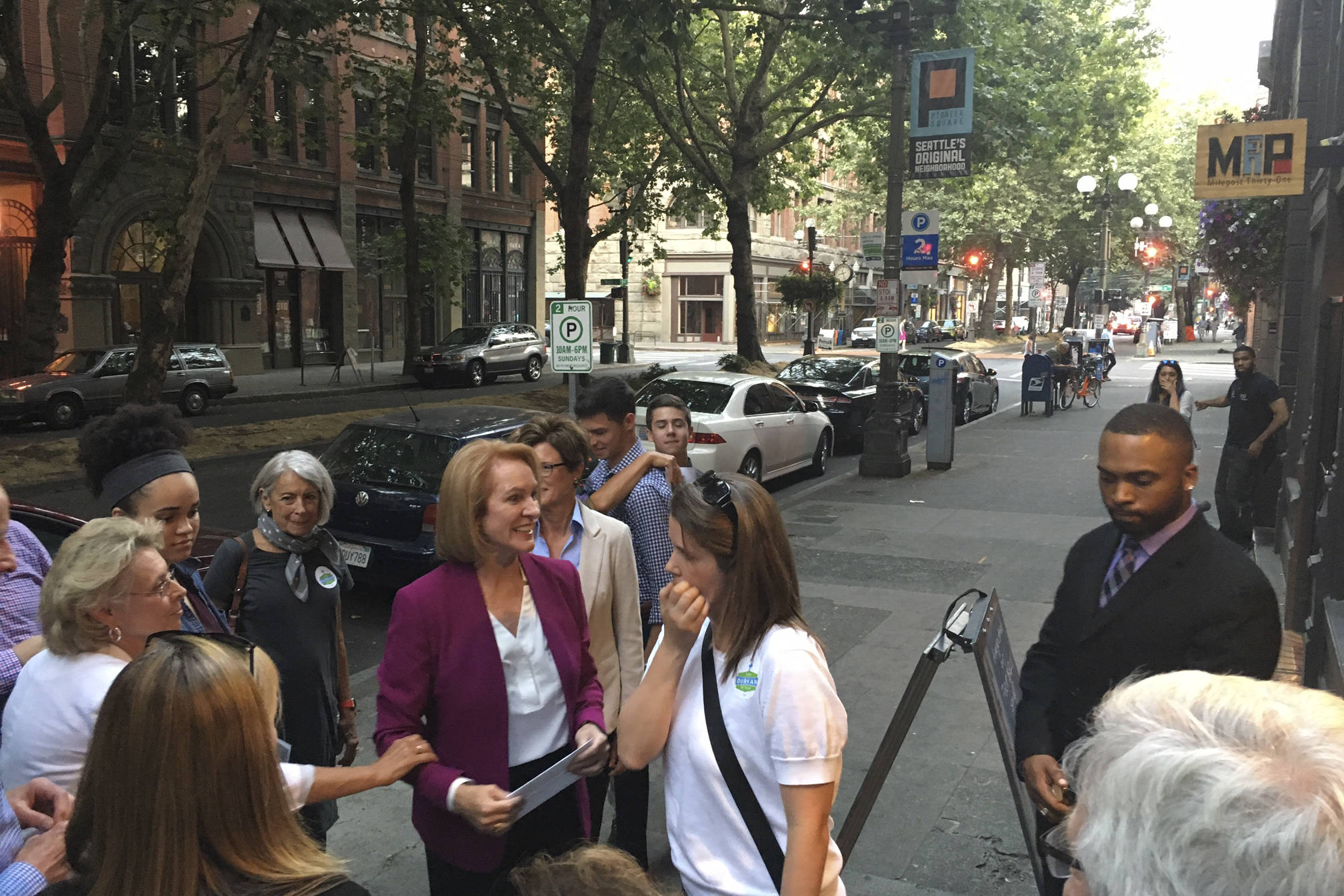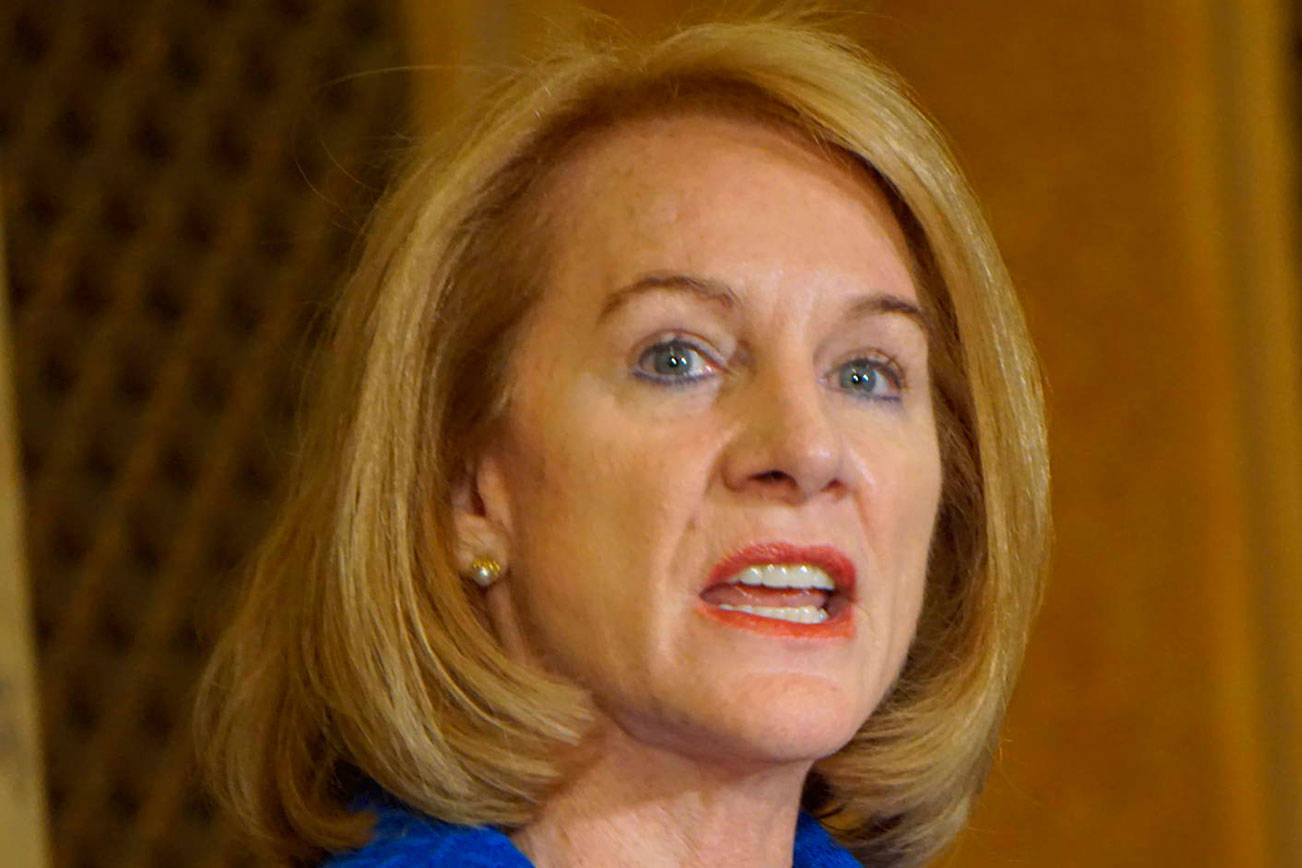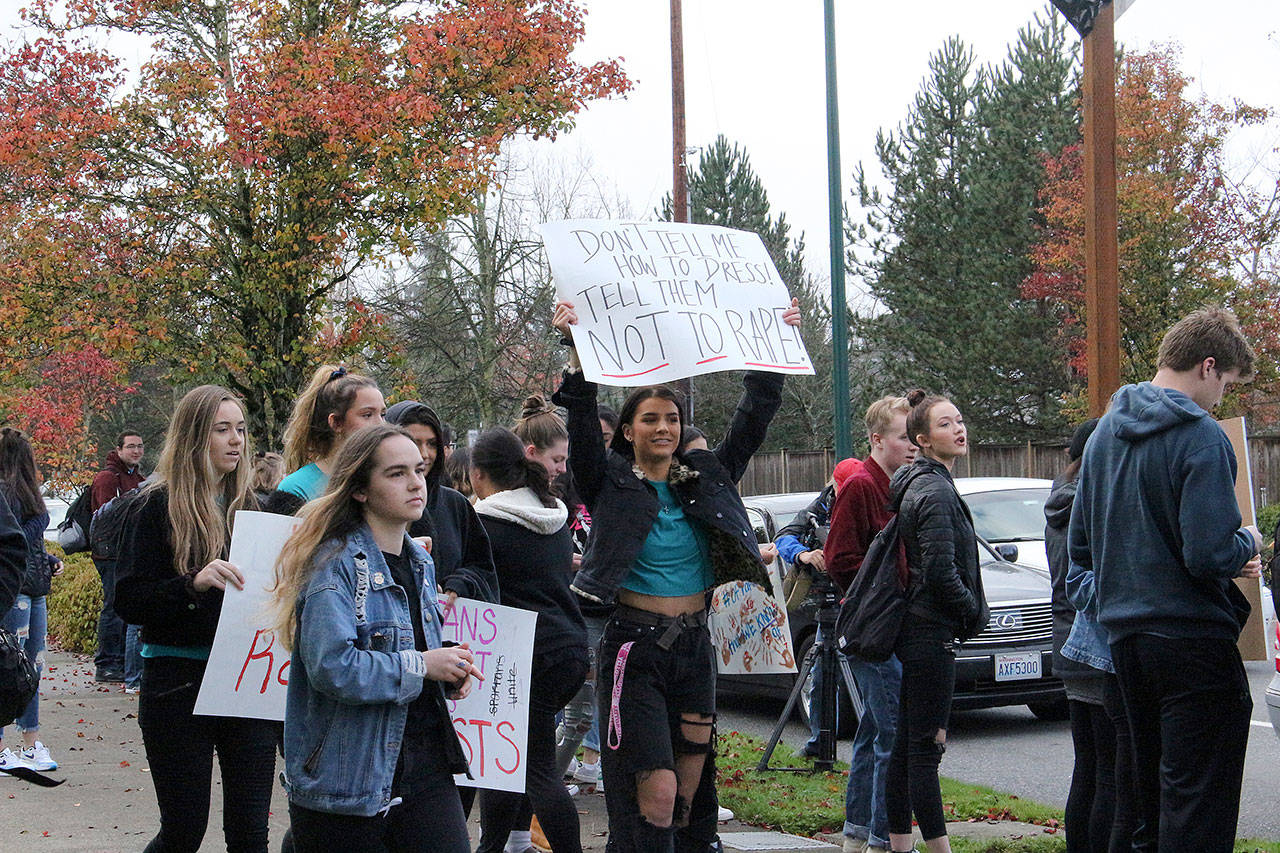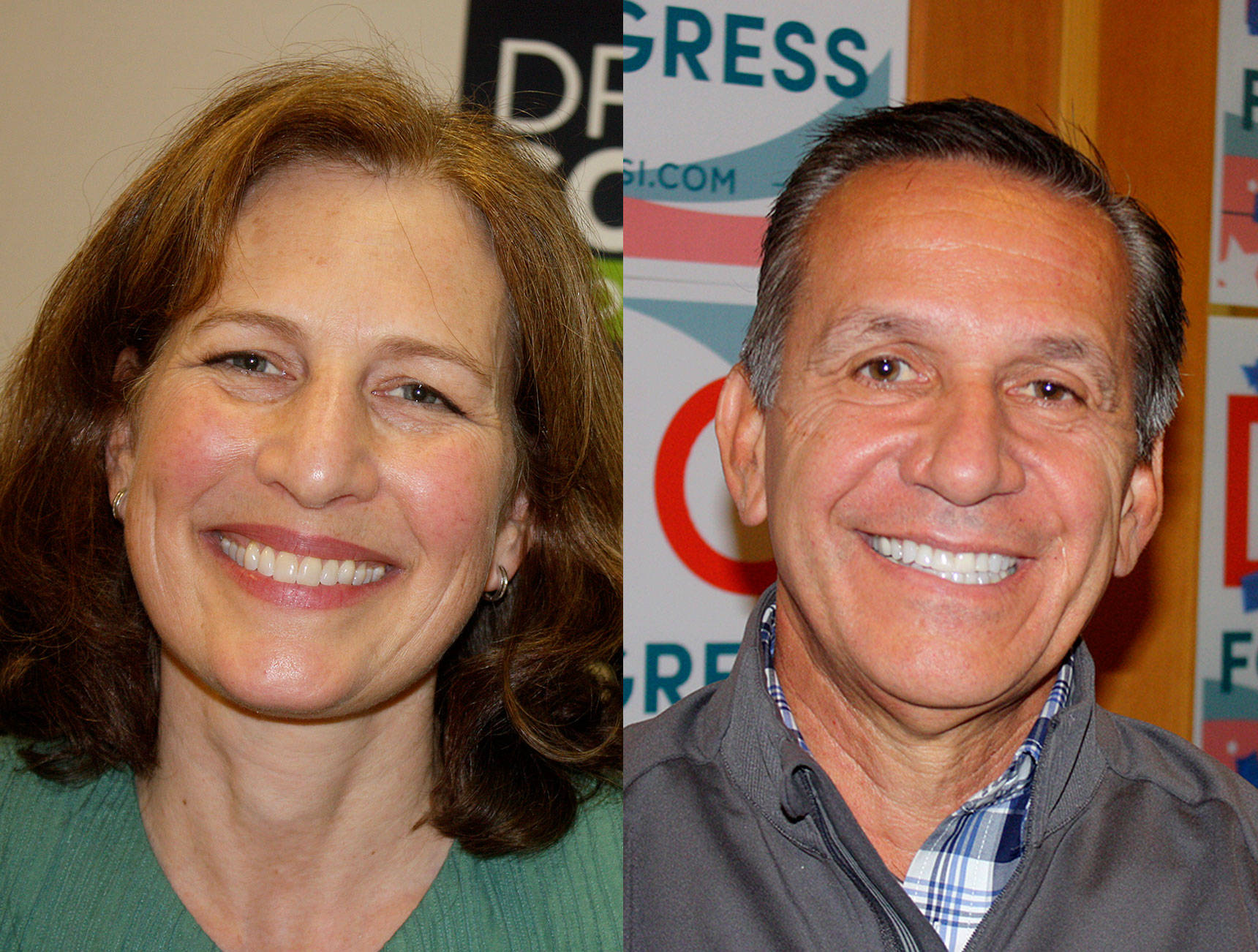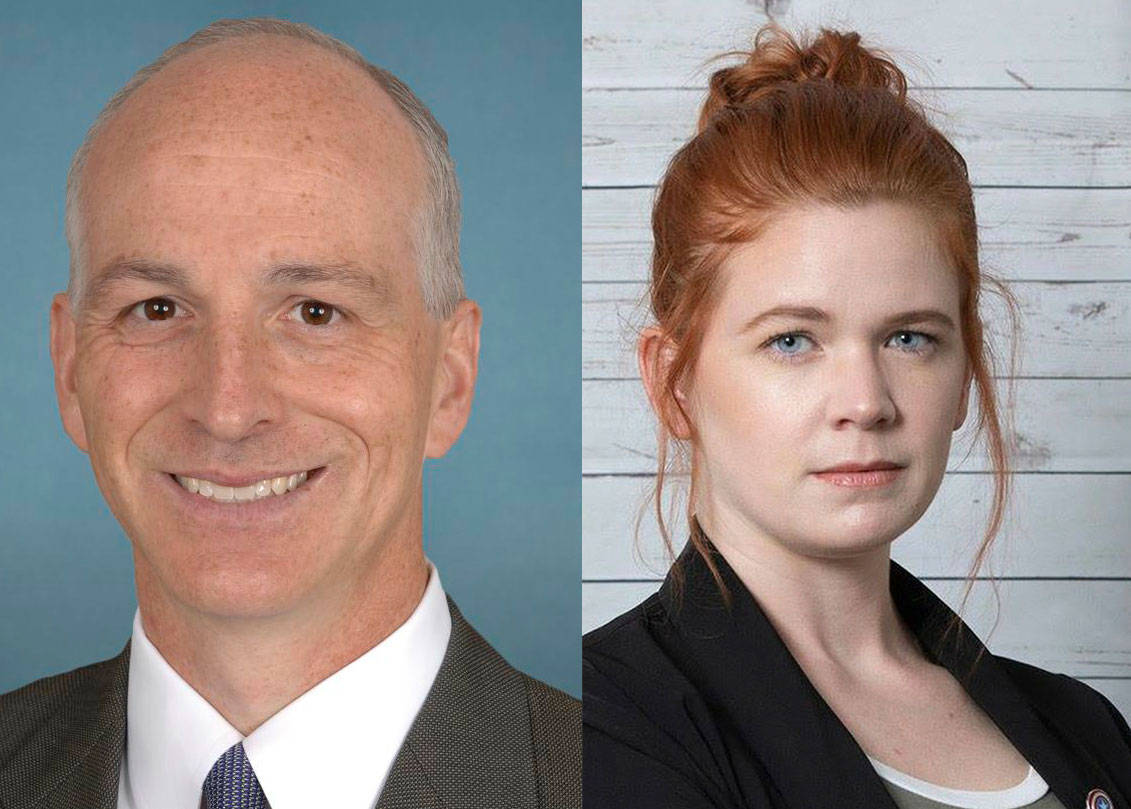As mail-in elections do, last night’s ballot drop left a lot of open questions in the mayor’s race, or one big one at least: Who will challenge Jenny Durkan for mayor this fall? Durkan appeared in clear position for a first place finish in the primary with 31 percent of the vote. But after that it was a scrum between Cary Moon, Nikkita Oliver, and Jessyn Farrell. It likely won’t be till Friday at the earliest that we have an idea of who will move on to the next round.
Still, Tuesday evening saw the campaigns gather together to assess their performance, with some exuberant and others facing hard facts. We fanned out to six of the parties, and present here our impression in the order the candidates came in after the first round of ballot counting.
1. Jenny Durkan
The URL jennydurkanformayor.com belongs to the longtime Democratic strategist Cathy Allen. She’s had it for a while.
“I did it as a way to mess with Paul Schell’s head,” Allen said in the back of Altstadt, the German beer hall where Durkan held her primary night party. That is, Allen created the website to make Schell think Durkan was going to challenge him for re-election—putting the creation of the site somewhere in the year 2001. “I’m still paying on it,” Allen said.
Durkan did not run for mayor in 2001. But she’s running for mayor now—her website is jennyforseattle.com—and on Tuesday she notched a strong showing in the first drop of primary ballots, getting more than twice as many votes as her closest competitor Cary Moon. Based on the turnout for the Altstadt party, her key demographic seems to be people, like herself and Allen, who have been around Seattle politics for a while.
Shortly before Durkan took the stage, state Sen. Reuven Carlyle, Councilmember Tim Burgess, and former Gov. Christine Gregoire could be seen yakking by the stage. Councilmember Sally Bagshaw—sporting a cool leather backpack—soon joined them. I couldn’t hear what they were talking about, but I’m pretty sure it was something like, “Here gathers the Sacred Order of the Seattle Establishment.”
Bob Royer, brother to three-term mayor Charles Royer, wasn’t part of this klatch, but sipped on a German lager nearby. He brushed off any idea that Durkan was too establishment for the mayor’s office. “She’s a prosecutor. As mayor you’re the top law enforcement official in the city. They give you a gun,” he said. Later he added, “There’s a whole range of establishment. There’s a socialist establishment. There’s an outsider establishment.”
Lorrie McKay, who met Durkan working on gay and lesbian rights efforts in the early 1990s, said Durkan may be establishment, but in Seattle, that’s not such a bad thing.
“Jenny’s history in her own right of coming of age and being an activist of the same age and velocity of some of the current candidates—this city has established her. And in that sense, she is the establishment,” she said.
There was a group of youngsters at the party who were probably born during the Schell administration, but none were authorized to speak to reporters. When it came time for Durkan to speak to the graying crowd, these fresh-faced interns lined up behind her for the youthful optics. Looking out at Gregoire, Burgess, Royer and others, Durkan said: “This election is all about the future of Seattle.” DANIEL PERSON
2. Cary Moon
The big, blue eye of the Cyclops in Belltown looked down upon the crowd filtering out of the bar below. Its half-lidded, perpetual stare felt all-knowing, as if it alone was clued in to how the the results of this night’s first ballot drop would read.
There wasn’t any music playing as people stood around clutching signs with “Cary Moon for Mayor” in capitals the same color blue as the eye outside. Just after 8 o’clock, the night’s only results came in, telling us what the eye already knew.
Moon was rushed to the heart of the crowd. Bright, fluorescent television camera lights shone in her face.
“Who has the numbers?” Someone shouted from the depths of the crowd. “Read them out!” The first polls had Jenny Durkan in a comfortable lead with 31.6 percent of the vote (27,579 votes). Moon was in second with 15.56 percent (13,583 votes).
Moon mouthed “wow” when the numbers were read. Her face split into a smile while her supporters started raucously cheering. She punched the air triumphantly. “This is surreal,” Moon said.
The bar was small for the amount of people, and energy, crammed into it. Faces were flushed, both with heat and excitement.
“In a field of 21 with six serious candidates,” Moon said, “I was ready to be in second place or sixth place, I really had no idea. I feel kind of in a state of surprise.”
Jean Johnson, a member of Social Venture Partners Seattle, has been a Moon supporter from the beginning. Her hope was that Moon would clinch a finalist position so that more people would listen to her message.
“I’ve seen people who didn’t know anything about Cary and they watch her speak and they’re convinced,” Johnson said. “She wins people over once they hear her passion and how knowledgeable she is. If she becomes a finalist, with that platform, she’ll have a real shot.”
Moon, however, tempered her optimism with realism.
“It’s pretty exciting the number of people who resonated with my vision,” Moon said. “As a first time candidate, that feels incredible. But, I want to recognize that everything is probably going to shift.”
The reality, that Moon is well aware of, is that this is just the first count. There are many ballots that still have to be counted.
“I’ll just be frank,” Moon said, “Nikkita’s numbers are going to rise. I will not be surprised if Nikkita overtakes me.”
Currently, Nikkita Oliver is in third place with 13.9 percent of the vote. That’s just 1.6 percent below Moon.
“Whether she’s in second or I’m in second,” Moon continued, “I’m really excited to work on it together and take on the establishment party however we can. It’s going to take all of us.” NATHALIE GRAHAM
3. Nikkita Oliver
Say what you will about Nikkita Oliver and the People’s Party—they know how to throw a party. Jamaican food, impassioned speeches, and musical acts including Kimya Dawson occupied Washington Hall on Tuesday evening.
Under the waning, world-warming August sunlight, the building broiled like a three-story oven. Several people wore pink t-shirts with purple lettering which read, “QUEERS 4 NIKKITA.” Half the windows of the grand old building gaped open, gasping for ventilation, but the body heat of hundreds of Oliver supporters accumulated in the Hall’s auditorium. Walking up stairs from the stage floor to the balcony seating, one could feel the air temperature and humidity increase. Around the room, several people fanned themselves with paper.
“You know why it’s so hot, right?” said the MC. “Because our community is on fire!”
For hours of ado before Oliver took the stage, speaker after speaker sang her praises, sometimes literally. “It’s not a question of good politics, it’s a question of revolutionary politics,” said longtime Seattle activist Juan Jose Bocanegra to cheers from the audience. “We’re going to fight like hell…because we have no other choice!” said Bocanegra. “We have no choice!”
The recent killing of black Seattle mother Charleena Lyles by Seattle police was on everyone’s minds and the subject of much “Say her name” call-and-response chants with the crowd. One common observation of the night: that the entire Seattle mayor’s race has been dominated by reactions to Oliver. “She says something, and I see everybody follow her,” said Danni Askini, Executive Director of the Gender Justice League.
When Oliver took the stage at long last, it was to an extended chant of her name by the crowd. She responded by inviting the crowd to come closer. “We often say when we organize we win, but I say when we organize we thrive,” she said.
During her speech, and the encore slam poetry performance which followed it, Oliver made no mention of the initial election results, which put her in a close third place after Cary Moon. There were still thousands of ballots to be counted, so the race to face first-place winner Jenny Durkan in November was still toss-up. But for Oliver, it wasn’t about that.
“Stop checking your phones,” she said on stage. “As much as the vote matters, the movement matters more…There’s a reason we’re not putting [election result] numbers up here: because what we want you to leave here with is this,” she said, gesturing at the audience. “Community.”
By following the Peoples Party’s lead on key issues like criminal justice reform, said Oliver, other mayoral candidates “aligned themselves with us.” Whichever candidates make it through the primary, she said, the people in Washington Hall must hold them “accountable for ‘what Nikkita said, and…’”—a common refrain at debates, where other mayoral candidates would often piggyback off Oliver’s statements.
Only by continuous voting and organizing and agitating, she said, would the people of the Party survive in Seattle. “To stay in Seattle, y’all gotta organize,” she said. CASEY JAYWORK
4. Jessyn Farrell
Did you know Jessyn Farrell plays saxophone? Or at least, she did in the Husky Marching Band. That’s where she met James Paribello, the unofficial communications and social media guy on her campaign. “When she told me she was going to run, I told her I’d do whatever I can to help,” the fellow saxophonist told me at the candidate’s Lost Lake election night party. The bar side of Lost Lake was packed with sensibly dressed Farrell supporters sporting collars and nice blouses, drawing lots of confused side-eye from the diner side’s overwhelmingly tattooed, black t-shirt crowd. “Who is Jessyn Farrell?” one diner quietly asked their friend as I walked by the table.
Behind Kenny G and Skerik, Farrell might be the third most famous Seattle saxophonist right now. But that still landed her in fourth place in the initial count for the mayor’s race. The Democrat representing Seattle’s 46th district entered the mayor’s race in the middle of May after Mike McGinn, Nikkita Oliver, Cary Moon and Bob Hasegawa had already announced, the very same week as current front runner (both in primary votes and campaign dollars) Jenny Durkan.
“The upshot is that we’re in fourth place… a close fourth place, but we’re in fourth place,” Farrell told the crowd just after the ballot count dropped. “That’s why we were busy campaigning until literally 8 o’ clock tonight for every single ballot that is out there. We’re going to have to wait over the next few days and see what happens.” Beyond the woo!’s that met Farrell’s campaign thank you’s, her speech was met with little fanfare.
“The challenge has been time,” says Nicole Willis, director of tribal relations under Ed Murray who decided to join Farrell’s campaign after the mayor’s decision not to run for re-election. “We were really late in the race—we had to take time to find a successor in her district and make sure that was secure. She’s made huge strides in a short amount of time. I’m not terribly surprised [about the results]. I could feel better about them, but I’m also optimistic about the votes that haven’t been counted yet.”
The “votes that haven’t been counted yet” were the main topic of discussion after Farrell’s speech. Folks at the bar peering down at their smartphones muttered a solid mixture of not bad’s, still pretty close’s, and wait and see’s.
“It’d be interesting to know where the votes are coming from,” saxophonist/campaigner Paribello says. “Of course, she’s known best is her home district, she’s beloved over in the 46th, so I hope there are still a lot of votes to count over there. We did a lot of outreach to that neck of the woods, North Seattle, so I guess we’ll see. It’s a long shot, but stranger things have happened. She went from being virtually unknown in the rest of Seattle to, in 8 weeks, becoming a top tier candidate.” Unfortunately, the party came to a close having featured zero saxophone. KELTON SEARS
5. Bob Hasegawa
When I arrived at Bob Hasegawa’s house on Beacon Hill I was greeted by a grinning young woman who asked if I wanted to write something on the sign: a big piece of butcher paper rolled out on the sidewalk adorned with encouragement and hasty outlines of hands in different colors: “We love you Bob!” and “Bob you Badass!” it reads, and it’s not the only handmade sign at the party.
A close look at Hasegawa’s campaign signs reveals that the blue stripe across the bottom is painters tape. The part that says “Mayor of Seattle” is Sharpie.
As Hasegawa’s “sign guys,” a father son duo both clad in plaid proudly inform me that all Hasegawa’s signs are recycled from his 2012 state Senate race — you can even spot the white letters underneath if you look close enough.
The Sign Guys tell me there’s a skill to deciding where to stick them in the ground. You’re not looking for cul de sacs, but roads that turn off into larger residential areas. Not too close to the road, but not too far either. We chat about signs for upwards of fifteen minutes and it’s clear that they’ve put a lot of thought into this.
The Sign Guys, like most of the folks I spoke with at Hasegawa’s house, are the senator’s friends. They know him from his work with local unions, from campaigning for Bernie Sanders, or connecting through the 1999 WTO protests. The familiar atmosphere made the function feel more like a graduation party than anything—colorful star-shaped balloons, matching cupcakes, endless watermelon and some plastic leis for guests.
Hasegawa himself was wandering around in an old Mariner’s t-shirt sporting cargo shorts in the same color and some white Carhartt socks (no shoes).
The theme of the evening? You don’t need money to run a campaign. The motif? Hasegawa’s insistence that his campaign “had the best ground game.” I’m sure the Sign Guys would agree.
As the sun went down and the results came in showing Hasegawa in fifth place, he claimed to still be hopeful, insisting that later rounds of counting always change things. As his friend from the Glaizers Union informed me, “he’s a glass half full kinda guy.”
When the mosquitos emerged, and the plastic trash bags began to make the rounds I was left with stragglers: Three people lamenting America’s misunderstanding of socialism and a scruffy bartender with two hot dogs in one hand. The bartender, it turns out, didn’t vote for Hasegawa. He knew Hasegawa would lose, but they’re friends, so he came anyway.
“He’s my brother — I mean, I love the man,” he says, then tells me they were delegates together for both Bernie Sanders and Barack Obama.
“We need him in our life. We can’t lose Bob’s gifts. I’m glad he’s still in the senate, cause he is an ally.”
As for Bob himself, he only shrugged when I asked him how he was feeling.
“I feel great. We did what we set out to do and proved that you don’t need a million bucks to run a campaign.” CHRISTY CARLEY
6. Mike McGinn
From the outset, former mayor Mike McGinn didn’t seem very hopeful that the night was going to swing his way. “Nervous!” he offered, at first blush, before any ballots dropped, as everyone stood around in the sweaty heat, clutching their drinks and murmuring. “I always feel nervous on election day.” But then: “I feel good. I feel good about the issues I raised,” he said. “And I’ve had a lot of fun. You look around the room and you see my friends. I’ve had a lot of fun engaging with my friends, engaging with communities I’ve worked with in the past. … So, you know, no matter what happens tonight, I’m glad I got in it. I’m glad I gave it a shot.”
Several dozen supporters—indeed, many of them former staffers and campaigners, family and friends—crowded round a handful tables at Plum Bistro in Capitol Hill, the largest one laden with an all-vegan spread. It seemed clear the night was full of reunions and old friendships; hugs were exchanged; McGinn made the rounds, grinning. But the air, from the beginning, was subdued. It seemed safe to assume that despite their admiration for the man, no one really thought he’d get there this time.
Addressing the room before he knew the results, McGinn explained that he’d consulted his family before running for mayor again, and, in the end, had taken the advice of his daughter, who told him, “’If you’re gonna fail, fail big.’”
Nevertheless, former deputy mayor Darryl Smith cried “McGinn for Mayor!” at the end of the speech, waving a black baseball hat that read the same phrase in white letters: a relic from the very first McGinn campaign. Since Smith worked with McGinn for four years, he said, “I really believe in Mike. He’s one of the smartest people I’ve ever been around.” And, like a number of former staffers, Smith believes some of the things Seattle takes for granted now didn’t really exist before McGinn was in office. Smith pointed to McGinn’s emphasis on community involvement in civic life; McGinn himself pointed to Seattle’s new appetite for city-funded transit, bike lanes, and municipal broadband, all ideas he put forward years ago.
“I think a lot of his ideas were four years ahead of his time, in some ways,” agreed Sol Villarreal, also a former McGinn staffer.
After the results came out – showing that McGinn trailed the two frontrunners, Cary Moon and Jenny Durkan, by a huge margin – McGinn told the room that the results were disappointing, but not surprising. In an interview afterward, he elaborated: Seattle is a changing city, and voters want change. A former mayor is “not perceived as being part of that change,” he conceded. But, again, “I felt I just needed to go out there and make that pitch. If I didn’t do it, I would be thinking, ‘Should I have done it?’ I’d rather go in and find out.” SARA BERNARD
news@seattleweekly.com
A previous version of this story said that only one-in-five ballots had been counted as of last night. In fact, closer to three-in-four ballots have been counted. The post has been corrected.
